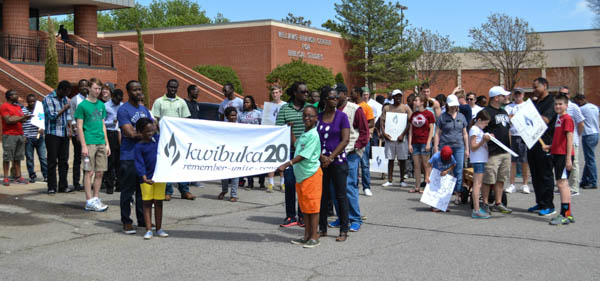Photo by Abby Bellow
From April through July of 1994, violence and terror engulfed the country of Rwanda and led to the deaths of more than 800,000 people. For 100 days a Hutu majority committed genocide against a Tutsi minority.
The 20th anniversary of the genocide in Rwanda brought back a flood of emotions and memories to its survivors, but the Rwanda where this genocide took place is in many ways gone forever. A new Rwanda is taking strides in becoming a leader in Africa and moving forward from that bloody period.
“We are doing things to move on while remembering what happened, because you have to know where you come from to know where you’re going,” Clement Makuza, a junior at Oklahoma Christian University from Kigali, Rwanda, said. “That’s what moves us – our motivation to go forward.”
Although two decades have passed, the public still holds several misconceptions about what happened in Rwanda. The genocide wasn’t a battle fought or a civil war waged.
“Some people thought it was an ethnic battle between ethnic groups,” Mike O’Neal, president emeritus, said. “The long-term history says that they were really of the same ethnic group. It was the colonists, the Belgiums mostly, divided the people between the Tutsis and Hutus, and began to engender this hatred between them by giving one group all the privileges and leaving the other people in poverty.”
The violence wasn’t a spontaneous development, however, power struggles plagued the country for the years leading up to the genocide. Extremist Hutus propagated anti-Tutsi speech, handed out Tutsi kill lists and distributed scores of machetes to Hutus.
The tension reached its breaking point after Rwandan leader Juvenal Habyarimana was killed when surface-to-air missiles hit his presidential jet outside Kigali on April 6, 1994.
An estimated 70 percent of the Tutsi population living in Rwanda was killed. The genocide affected the entire nation. Most families were displaced; they lost contact with family members and most lost loved-ones.
“It affected our family of course,” Makuza said. “We had to flee. Like many people, they were displaced in the country – separated from each other. I was still a kid, a baby. My mom, my dad didn’t know where their relatives were. They weren’t sure if they were still alive, and that is the story for everybody.”
In mid-July the genocide ended when rebel forces, the Rwandan Patriotic Front led by Gen. Paul Kagame — now the president of Rwanda, took control.
After the genocide, O’Neal said Rwanda was decimated.
“In 1994 the country was totally destroyed,” O’Neal said. “There was nothing. There were no social organizations, no government, no infrastructure, no education, nothing.”
O’Neal first visited Rwanda in 2004. Over subsequent visits he could see what direction the country was headed.
“To see how far they have come in 10 years was actually pretty amazing,” O’Neal said
“Every time I go I see new roads paved, I see new hotels going up, I see new homes being built. In my experience in life I don’t know of any place that has progressed as rapidly as they have.”
O’Neal has visited the country eight more times since then, and remains one of the main influences behind Oklahoma Christian University’s current relationship with the country. Rwanda, through its Presidential Scholars Program, brings 10-20 Rwandan students each year to study on campus. Because of O’Neal’s work with the country, President Kagame appointed him Chancellor of the University of Rwanda last year.
“The whole purpose behind this Presidential Scholars Program is to change that nation and to change the region around it,” O’Neal said. “We’re shaping the future of that part of Africa. I’m confident that some of these young people that we’re educating here at Oklahoma Christian will be the future leaders of that country.”
According to O’Neal, the Rwandan students will bring what they learn at Oklahoma Christian abroad as an influence wherever they go.
“I hope that they’ll see that through applying themselves that they can make a difference in the quality of life of their people,” O’Neal said. “They can solve the problems and help Rwanda to close the gap between the developed countries and developing countries.”
Rwanda has changed drastically; it is becoming an example to other countries in the region, according to O’Neal – who credits God for the good works in Rwanda.
“I would hope what people know today is that because of the ability God has given human beings to overcome adversity – that this country is now a beacon of light – a shining light in Africa,” O’Neal said. “The reason it is, is because its people are embracing values that are for the good of the people in the country. Corruption is almost nonexistent in Rwanda.”
A bright future is awaiting Rwanda, O’Neal said, and that future will redefine the country and hopefully the continent.
“My hope is that someday when people think of the word ‘Rwanda,’ that they don’t think genocide first,” O’Neal said. “That they think this is a place of enlightenment; this is a place of progress. It is a place where God’s people can flourish. That’s my hope – that eventually we can get to that point.”












Be First to Comment